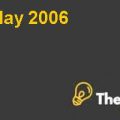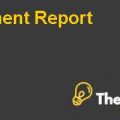Fair-mead Marine Case Study Solution
Introduction:
Fair Mead is a private limited company operating out of British Columbia, Alberta. It has been founded by Dr. William Fair (the money behind the enterprise) and Clinton Mead (the brains behind the whole operation). Fair Mead belongs to the recreational boat manufacturing industry that has shown growth from 2011 to 2015. The company is at the expansionary stage of the business cycle, and its primary product is a luxury item. Fair Mead manufactures both finished goods and customized products based on the customer’s preferences and instructions.
The company has capitalized on the cultural tradition of recreational boating in Canada, considered to be a favored pastime in the country. Fair Mead serves a specialty market consisting of high-income customers that desire to maintain a high social status, therefore demanding a superior quality, but at the same time, these clients happen to be cost-conscious and prefer affordability. Fair mead’s target market can be defined as a niche that has many risks associated with it. The company has also undertaken efforts to transform its product to be more environment-friendly, thus satisfying a significant trend that is currently emerging. Although the company’s sales depend on the boating season and the economic growth, it seems to have enjoyed a stable level of sales. Although the company’s primary sales are in British Columbia, it plans to expand to areas with heavy watercraft use and might represent potential sales.
Fair mead’s values indicate the broader vision with which it has been founded, that is, not to compromise on the superior quality as expected by the customers by adhering to their standards with integrity.
Fair mead’s value proposition comprises of high-end raw materials that do not just enhance the appearance of their boats but also ensures longevity and durability. The company heavily relies on its suppliers in order maintain this competitive advantage.
There are many weaknesses evident from the company’s operations that need to be overcome. Although not significant, these shortcomings can cause undermine any ambitions to grow and geographic regions to which it can expand its operations.
Problem Statement:
Mr. Fair’s constant interference in the production schedule is one of the major supply chain issues being faced by the company, delaying the delivery of products in time. Minor problems cause production to halt and leave little time for long-term planning.
Another major issue that had arisen was related to a relatively small scale supplier but had become a significant matter since, the supply chain manager, Morales had to take a tough decision as to whether to let go of him or take a risk by keeping him. Mr. Sharma was taking longer to fulfill the urgent orders as he had run into some problems of his own. The gap between the supply of Sharma’s materials and assembling of the products was causing a major issue for the company. Moreover, Mr. Sharma's fittings were not according to the specifications that had been mentioned, having used lower quality materials instead of the one ordered, thus jeopardizing the company’s endeavor to produce the most superior quality products. Mr. Sharma faced an interesting dilemma that is; he could either provide the desired quality within his time frame or supply on time but compromise on the quality. Miss Morales faces a challenge since; Sharma has the potential to grow into one of the major suppliers for the company which is why it would be a loss to let him go, while on the other hand continuing work with him with the same results could smear her reputation.
SWOT Analysis:
Strength:
Management Expertise:
The main strength for Fair-MeadMarine is its management; the case study scenario mentions that both the owners are very enthusiastic and committed to the performance of the business. The senior management is very experienced in their industry and almost knows every critical success factors and how to implement them in the organization. Fair and Mead both know each other very well and understand the nature and capabilities very well.
Innovation in the products:
The products of Fair-Mead are very innovative;the products include latest technology which appeals to the customers to try their products.Apart from the advanced attributes the boats also include basic attributes as well which plays a vital role in the success of the organization. Now a days the survival of the organization is dependent on the incorporation of innovation in their products, especially in the growing economy where people have high disposable incomes, the individuals continuously want to experience products which have some new features and Fair-Mead Marine is successful in exploring this strength.
Positive Culture:
The culture and working environment of Fair-Meadare very positive and encourage the employees to contribute to the success of the organization, the contributions of the employees are also greatly appreciated by the senior management, and are rewarded for their good performance. Furthermore, the culture of Fair-Mead forces every employee to discharge their duties ethically and perfectly. It is crucial for the long-term survival of the company that its workers which are considered to be the backbone of the organization are motivated enough to keep their performance up to the mark. If they are not motivated, it is highly likely that they cannot achieve full efficiency in their work. Fair-Mead Marine is in full compliance with this principle which proves to be the main strength of the company.
Weakness:
Worst relations with Supplier:
The relation of Fair mead with its main supplier Jay Sharma is not good in current days. Although the management of Fair mead was satisfied with the performance of Jay Sharma, currently several issues have arisen which results in the deterioration of the relationship with the supplier. On several occasions, the customers of Fair-Mead have made complaints in the work of Jay Sharma which is damaging the goodwill of the organization. Furthermore, the supply from Jay Sharma is also continuously delayed, which results in the increase in the overheads as most of the production plants often remain idle due to the delay in supplies. Furthermore, the communication between the supplier and the management of Fair-Mead is not effective and several miscommunications have arisen which are also impairing the relations between Fair-Mead and Boat Parts and More Inc.
Low Brand Equity:
It can be said that Fair-Mead is a small brand with lower brand identity, the customers know little about the brand, and they can switch the brand the quickly if they find complaints in the products. This might threaten the long-term survival of Fair-Mead.
High material cost:
The material cost represents the greater proportion of total cost; it can be argued that materials which are used in the production of boats are very costly which reduces the profitability of the boat manufacturers. Furthermore, Fair-Mead changes its suppliers frequently which might result in the increase in the material cost. The management of Fair-Mead is also unsatisfied with the performance of Boat Parts and More Inc and is considering terminating their business with them. Finding appropriate suppliers at a reasonable price might be difficult for Fair-Mead as the material prices are too high and this cost might increase if purchased from a new vendor.
Opportunities:
Greener Boats:
The modern day customers are becoming increasingly critical to the impact of the organization on the environment, if the impact of the organization’s operations is negative on the environment, the customers terminate their association with the company. There is a considerable opportunity available to Fair-Mead to use the environmentally friendly materials in its boats, and also the production should be in such a manner that reduces the carbon emission of the boat.Fair-Meadis currently involved in the production of greener boats, but more opportunities exist in this area of business.
Relocate the manufacturing plant:
Fair-Mead can relocate the production facility to the countries where production and assembling the boats is relatively cheap, and the availabilityof skilled cheap labor is high. In the current economic conditions, many companies are shifting their manufacturing plants to underdeveloped countries because the production are cheap and governments of those countries are giving many benefits to foreign companies to increase employment opportunities to the local peoples. But certain factors needs to be considered before making the final decision; the Canadian citizens might perceive it as unethical because the unemployment level in Canada might increase as a result of the relocation of the production facilities of Fair-Mead.
Export to other countries:
It can be said that this is the most lucrative opportunity for Fair-Mead to export their boats to other parts of the world where the demands for boats is high.As the demand for the products of Fair-Mead is seasonal in Canada, and the competition in Canada is too high in the boat manufacturing industry this strategy might increase the revenues of Fair-Mead drastically, not only this;it will also reduce risk forFair-Mead.
Long term contract with suppliers:
It is explicitly mentioned in the case study scenario that Fair-Mead is finding it difficult to maintain the long-term relations with the suppliers and the prices of the materials are continuously increasing in Canada. Fair-Mead might enter into long-term contracts with the suppliers and can fix the prices to hedge itself against the adverse movements in the prices. Furthermore, the relation with the suppliers might also become positive due to a contract which is legally enforceable.
FAIR-MEAD MARINE Harvard Case Solution & Analysis
Threats:
Competition:
The competition in the boat manufacturing industry in Canada is considered to be relatively high, which might be very crucial for Fair-Mead. As Fair-Mead is a small company, it might not survive while maintaining its profitability if the competition is increasing. Further, any big player in the industry could easily knockout Fair-Mead if brand recognition is continues to be poor. Furthermore, to tackle this situation,Fairmead should have to improve the quality of its products and bring constant innovations in its products without affecting prices.
Boats are not anecessity:
It can be argued that people's just purchase boats to fulfill their passion, boating is a hobby of those people who have high disposable income. Recession in the economy might force the customers to reduce the expenditure in boats which might reduce the revenues and profits of Fair-Mead.....................
This is just a sample partial case solution. Please place the order on the website to order your own originally done case solution.











